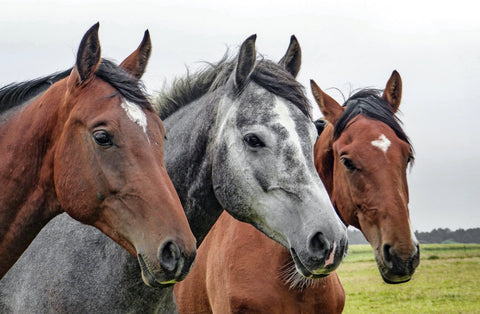
Florian ist aufgewachsen auf einem Bauernhof. Umgeben von Pferden, entdeckte er früh seine Faszination für diese majestätischen Tiere. Inspiriert von seiner reitbegeisterten Mutter, entwickelte er das Nahrungsergänzungmittel - Pferdegold. Seine tiefe Verbundenheit zur Natur und die leidenschaftliche Hingabe zu Pferden trieben ihn an, sein Unternehmen zu gründen.
Veterinarians can (unfortunately) confirm it: metabolic diseases such as Cushing's or EMS occur much more frequently today than in the past.
These metabolic disorders in horses can have far-reaching consequences and significantly impair the quality of life of our four-legged friends.
If the horse suffers from ECS (equine Cushing syndrome) or EMS (equine metabolic syndrome), for example, the path to secondary diseases such as diabetes and insulin resistance is often not far.
Not to be forgotten: laminitis. This inflammation of the hoof capsule is very painful for the horse and difficult to get rid of.
It's therefore incredibly important to treat metabolic diseases as early as possible. Even better, to prevent them. But how can we support our horse's metabolism and prevent metabolic problems in horses?
We'll clear things up!

Metabolism: What is it actually?
The term "metabolism" is often misused. Metabolism , as it is also called, is not the same as digestion—it is much more than that.
It is the heart of our horse’s health and vitality .
The short version: Metabolism includes all processes that lead to energy production and the building of body components.
These are all the biochemical processes that take place within cells. Metabolism thus has several jobs at once:
He is the
- Energy center,
- nutrient utilization,
- Cell regeneration and
- Detoxification department.
Among other things, metabolism ensures that food is broken down into tiny particles and broken down into small pieces, which then enter the bloodstream where they supply the body with energy.
The most important organ is the liver .
By the way, there is not just one, but several metabolisms , such as mineral metabolism , hydrogen metabolism or carbohydrate metabolism (sugar metabolism ).
Diabetes , which can occur not only in humans but in all mammals, including horses , is a disease of sugar metabolism.

Perfect for your horse: Pferdegold® supplementary feed!
These specially developed supplements support your horse's diet and provide it with natural nutrients. Made in Germany, grain-free and drug-free, they come with a 30-day money-back guarantee.
Try it now!How do I recognize a metabolic disease in a horse?
As already mentioned, there are various metabolic diseases . However, the signs and symptoms are similar.
These include:
- lethargy, dullness, exhaustion
- Performance decline
- Difficulties with shedding
- disturbed fat distribution
- Reduction of muscle mass
- Laminitis
- Reduced fertility
- Sawhorse position
- Pains
- Sweating
- increased pulse
- increased breathing
- increased temperature
- Colic symptoms
- missing bowel sounds
What metabolic diseases exist in horses?
Metabolic diseases in horses are diverse and can affect various aspects of a horse's health and well-being .
They can be caused by genetic factors as well as environmental and nutritional factors .
The most common metabolic diseases in horses are equine metabolic syndrome (EMS) , equine Cushing syndrome (ECS, also known as PPID) and polysaccharide storage myopathy (PSSM) .
EMS
Equine Metabolic Syndrome (EMS) is a metabolic disorder that often occurs in overweight horses . It is characterized by insulin resistance , obesity , and an increased risk of laminitis.
The main causes of EMS in horses are obesity and lack of exercise.
The horses are then no longer able to use insulin effectively, which leads to high blood sugar levels.
PPID (formerly ECS / Cushing)
PPID, also known as equine Cushing's syndrome, is a neurological disorder caused by an overproduction of the hormone cortisol.
The disease can disrupt the horse's hormonal balance, primarily affecting sugar metabolism.
Cushing's disease leads to symptoms such as coat changes, laminitis and increased susceptibility to infections.
Equine Cushing's syndrome , also known as PPID (Pituitary Pars Intermedia Dysfunction) , is a common hormonal disorder in older horses.
It is a disorder of hormone secretion in the horse's pituitary gland, which leads to the overproduction of hormones.
PSSM
Polysaccharide storage myopathy (PSSM) is a genetic disorder that impairs muscle function. Horses with PSSM have difficulty converting sugar into energy , leading to muscle cramps and weakness.
The disease can be contained through an adapted diet and targeted training.
Possible causes of metabolic problems in horses
Metabolic problems in horses can be caused by a variety of factors .
Often it is a harmful mix of stress , lack of exercise and unsuitable diet that leads to these problems.
Genetic causes
Some breeds are simply more susceptible than others. These include, in particular, robust breeds such as Norwegian, Shetland, Icelandic , and Haflinger .
These are breeds that originally lived in a barren landscape and had to make do with a sparse supply of food.
This DNA has remained. Their bodies don't need much to stay healthy—quite the opposite. In our country, these animals are often literally fed until they become sick.
Other horses that are genetically predisposed to metabolic diseases such as EMS include Arabians and Quarter Horses , but also thoroughbreds such as trotters and gallopers .
Speaking of Icelandic horses, they are also particularly susceptible to sweet itch . Up to 50 percent of horses imported from Iceland suffer from it.
In sweet itch, the metabolism is overloaded, and the animals react allergically to the saliva of midges . This problem doesn't exist in Iceland: there are no midges there.
Incorrect food and lack of exercise
What grows in the meadows is often not the real thing. In other words, it contains too much sugar . And no horse needs sugar . But grass is often full of sugar .
Even hay , which is often available to horses around the clock, has become a real problem due to its sugar content . When muesli and various supplements are added to the mix, the sugar content quickly becomes too much for the horse.
Perennial ryegrass is widely represented . It contains a lot of sugar and fructans , but less protein. Given this sugar shock, it's hardly surprising that one in two horses is overweight.
And obesity is one of the causes of metabolic disease .
Just like us humans, horses love sugary foods. It tastes so good!
However, this quickly overwhelms the metabolism and digestion. 1.5 kilograms of high-sugar hay per 100 kilograms of body weight may not sound like a lot, but it can already promote metabolic diseases.
To put it in context: These four-legged animals once lived on the steppe . Their lifestyle back then would surely inspire sports medicine experts with enthusiasm— plenty of exercise (up to 16 hours) and meager food . The horses spent most of their day running (not fast, but long distances) and eating (small portions).
Digestion therefore always had something to do.
Therefore : plenty of exercise, feed low-sugar hay and please no long feeding breaks!

Stress as a trigger for metabolic problems
Even horses that do not have to be in the transporter all the time or perform at peak levels can suffer from stress .
Just like with us, problems in a group lead to stress – and , if they persist, develop into chronic stress . This, in turn, puts a strain on the metabolism .
If the group is too large, harmony quickly disappears. The " battle of the sexes " also plays a role . Too much of an imbalance between geldings and mares is not recommended.
If the horse is permanently stressed , another problem often arises.
Horses also try to relieve tension – and compensate. How? By eating ! Who hasn't experienced the phenomenon of suddenly being plagued by ravenous hunger attacks shortly before a test?
Four-legged friends feel the same way, because chewing is incredibly calming – and, just like with us, can quickly lead to obesity.

How is a metabolic disease diagnosed in horses?
If you suspect that your horse is suffering from a metabolic disease , the first step is to consult your trusted veterinarian .
He will then examine your horse's blood carefully.
Diagnosis of Equine Metabolic Syndrome (EMS)
A veterinarian will first perform a thorough physical examination to detect signs of overweight or obesity, regional fat distribution, and laminitis.
Laboratory tests can then be performed to measure insulin and glucose levels in the blood. These levels are often elevated in horses with EMS.
Diagnosis of equine Cushing's syndrome (ECS)
The diagnosis of ECS is based on a combination of clinical signs and laboratory tests . Clinical signs may include
- long,
- curly fur,
- Problems with shedding,
- Changes in behavior and
- Muscle atrophy.
To confirm ECS, the veterinarian will take a blood sample and test for the pituitary gland's ACTH hormone . ACTH levels can fluctuate greatly depending on the season.
From November to July, the ACTH level of a healthy horse should be below 29 pg/ml , and from August to October below 47 pg/ml. A significantly higher ACTH level often indicates ECS disease.
Diagnosis of polysaccharide storage myopathy (PPSM)
The diagnosis of PSSM can be somewhat more complex than that of EMS or ECS, as it usually requires a combination of clinical signs , genetic testing , and muscle biopsies .
Clinical signs may include muscle weakness, stiffness, sweating, tremors , and even colic-like symptoms .
A genetic test can be performed to identify the specific mutation causing PSSM. This test typically requires a blood or hair root sample sent to a specialized laboratory.
It is important to note that there are two different forms of PSSM - PSSM1 and PSSM2 - and genetic testing can help differentiate between the two.
A muscle biopsy can also be used to diagnose PSSM. A small sample of the horse's muscle tissue is taken and examined under a microscope.
In horses with PSSM, muscle tissue often shows abnormal accumulation of glycogen .
It is important to note that the diagnosis of PSSM requires a thorough examination by an experienced veterinarian .
Once a diagnosis has been made, appropriate treatment can be initiated to relieve symptoms and improve the horse's quality of life.

Pferdegold® supplementary feed!
Pferdegold is a small family business from Bavaria with a big dream: to produce the best horse feed. We see ourselves as a family of equestrians who want to provide your horse with the ideal nutrition. 100% natural and perfectly tailored to your horse's needs.
Try it now!The right feeding for your horse's metabolic problems: What you should consider
Feeding a horse with metabolic problems can be a real challenge. It's not just what your horse eats that matters, but also how he eats .
A balanced diet is key to supporting your horse's metabolism and preventing health problems.
Hay: sugar bomb or healthy food source?
An important first step is to understand exactly what's in the hay you're feeding your horse. Is it a hidden "sugar booster"?
To find out, you can send a sample of your hay to a specialized laboratory . They can determine the exact nutrient and sugar content .
The right food selection
If your hay turns out to have a high sugar content, it's time to change the feed. If a change isn't possible for some reason, there are ways to "stretch" the hay .
A good option is alfalfa , which is rich in protein and fiber and can support your horse's metabolism.
Some also recommend straw as a feed supplement . But be careful: Straw contains few nutrients and can cause injuries in your horse's mouth. Therefore, it's important to carefully monitor feeding and adjust it as needed.
Individual feeding plans
Every horse is unique and has its own nutritional needs .
For horses with metabolic problems, it is especially important to create an individual feeding plan that is tailored to the horse's specific needs.
A veterinarian or equine nutritionist can be of valuable help here.
Proteins
Proteins are the basic building blocks of muscles and, along with carbohydrates and fats, are the most important macronutrients.
Protein can boost fat burning and thus fire up your metabolism—especially when combined with exercise. Soy, for example, is a high-quality source of protein —as are the two amino acids carnitine and methionine . Amino acids are the building blocks of proteins.
magnesium
Magnesium is one of the most important minerals of all. The mineral is considered a true metabolic manager.
No wonder, since more than 300 metabolic processes depend on magnesium .
Whether it's muscles, heart, nerves, or energy supply, the all-rounder magnesium is of key importance here – just as it is for bone, joint, protein, carbohydrate, and fat metabolism. Therefore: cheers for magnesium!
Herbs and medicinal plants against metabolic diseases in horses
In addition to proper feeding, certain herbs and medicinal plants can also help prevent or treat metabolic diseases in your horse.
Artichokes and dandelions
Artichokes are a truly exquisite food—and they contain the bitter substance cynarin, which is said to regulate metabolism and stimulate fat digestion.
Furthermore, the plant from the daisy family provides a lot of fiber, more precisely 10 grams per 100 grams .
The bitter substances in dandelion can stimulate the appetite and metabolism.

The medicinal plant is considered
- digestive,
- appetizing,
- flatulent,
- diuretic and
- kidney flushing
and is also said to promote bile secretion .
Milk thistle as a medicinal plant for metabolic diseases
Even the ancient Greeks used milk thistle as a medicinal plant . This prickly fellow is said to have several beneficial properties.
On the one hand, it is supposed to stimulate the metabolism, and on the other hand, it is supposed to support liver and kidney function .
Milk thistle contains silymarin . This substance is used, among other things, as a supportive treatment for chronic inflammatory liver diseases , liver cirrhosis, and toxic liver damage —and in the case of death cap poisoning , which causes severe liver damage.

MSM
MSM is considered the best source of sulfur . MSM improves the permeability of cell membranes and thus also metabolism.
The nutrients can be better absorbed by the cells and excess metabolic products and waste can be more effectively removed from the cells.
Remember: A healthy diet is one of the most important building blocks for your horse's health and well-being. With the right feeding, you can help keep metabolic problems at bay and your horse fit and happy.
Conclusion
Promoting your horse's health is in your hands. With proper care, the right nutrition, and a generous portion of love, you can help ensure your horse lives a healthy and happy life.
At Pferdegold, we are always ready to support you with advice and assistance, and we do our best to ensure that your horse receives a healthy, high-quality supplementary feed in its feed bucket.
FAQ
What boosts a horse’s metabolism?
A balanced diet, regular exercise, and minimal stress are key to stimulating metabolism in horses. Certain nutrients such as protein and magnesium can also support metabolism.
In addition, certain medicinal plants and herbs, such as artichokes and dandelions, can stimulate the metabolism.
What is the life expectancy of horses with a metabolic disease?
The life expectancy of horses with a metabolic disease can vary and depends greatly on the type of disease, early detection, and treatment. With proper diagnosis, therapy, and nutrition, a horse with a metabolic disease can lead a normal and healthy life.
However, it is crucial to work closely with a trusted veterinarian to ensure the best possible care.
How much does a PSSM test for horses cost?
The cost of a PSSM (polysaccharide storage myopathy) test in horses can vary depending on the region, veterinarian, and laboratory.
On average, the cost of such a test is between 50 and 150 euros. It's advisable to check with your veterinarian or a specialized laboratory for exact costs, as these can also depend on the type of test and the associated services.
Important:
Pferdegold is not a substitute for veterinary diagnosis or treatment. The information contained in this article is for general informational purposes only and is intended to help improve your horse's well-being.Pferdegold products do not treat or cure diseases , but rather support your horse in compensating for nutritional deficiencies through targeted nutrient intake .
However, they are not a substitute for professional advice from a veterinarian or specialist. If your horse has any health problems, we strongly recommend consulting a veterinarian. Pferdegold assumes no liability for decisions made based on the information provided here. Colic in horses: Changes in weather & other causes

















